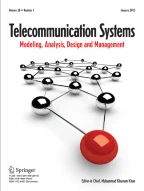Abstract
This paper introduces a protocol that distributively constructs a collision-free schedule for multi-hop packet radio networks in the presence of hidden terminals. As a preliminary step, each wireless station computes the schedule length after gathering information about the number of flows in its neighbourhood. Then, a combination of deterministic and random backoffs are used to reach a collision-free schedule. A deterministic backoff is used after successful transmissions and a random backoff is used otherwise. It is explained that the short acknowledgement control packets can easily result in channel time fragmentation and, to avoid this, the use of link layer delayed acknowledgements is advocated and implemented. The performance results show that a collision-free protocol easily outperforms a collision-prone protocol such as Aloha. The time that is required for the network to converge to a collision-free schedule is assessed by means of simulation.
Similar content being viewed by others
Explore related subjects
Discover the latest articles, news and stories from top researchers in related subjects.Notes
This simulator includes all the assumptions and idealities discussed in the previous sections and it is available for download at www.jaumebarcelo.info/barcelo2011emp/simulator.py. Contact the first author for more details and the scripts required to generate the plot.
References
Andreev, K., & Boyko, P. (2010). Simulation study of VoIP performance in IEEE 802.11 wireless mesh networks. In MACOM (pp. 139–150).
Arikan, E. (1984). Some complexity results about packet radio networks. IEEE Transactions on Information Theory, 30(4), 681–685.
Barcelo, J., Bellalta, B., Cano, C., & Oliver, M. (2008). Learning-BEB: avoiding collisions in WLAN. In Eunice.
Barcelo, J., Bellalta, B., Cano, C., Sfairopoulou, A., & Oliver, M. (2009). Carrier sense multiple access with enhanced collision avoidance: a performance analysis. In ACM IWCMC.
Barcelo, J., Bellalta, B., Cano, C., Sfairopoulou, A., Oliver, M., & Zuidweg, J. (2009). Traffic prioritization for carrience sense multiple access with enhanced collision avoidance. In MACOM.
Barcelo, J., Bellalta, B., Sfairopoulou, A., Cano, C., & Oliver, M. (2009). CSMA with enhanced collision avoidance: a performance assessment. In: IEEE VTC spring.
Barcelo, J., Lopez-Toledo, A., Cano, C., & Oliver, M. (2010). Fairness and convergence of CSMA with enhanced collision avoidance. In ICC.
Barcelo, J., Bellalta, B., Cano, C., Sfairopoulou, A., & Oliver, M. (2011). Towards a collision-free WLAN: dynamic parameter adjustment in CSMA/E2CA. Eurasip Journal on Wireless Communications and Networking.
Barcelo, J., Bellalta, B., Oliver, M., & Banchs, A. (2011). Collision free operation in ad-hoc networks. In MACOM.
Chambers, B. (2002). The grid roofnet: a rooftop ad hoc wireless network. Ph.D. thesis, Massachusetts Institute of Technology.
Choi, J., Yoo, J., Choi, S., & Kim, C. E. (2005). An enhancement of the IEEE 802. 11 DCF via distributed reservation. IEEE Transactions on Mobile Computing, 4(4), 378–390.
Cicconetti, C., Lenzini, L., & Mingozzi, E. (2008). Scheduling and dynamic relocation for IEEE 802.11 s mesh deterministic access. In IEEE SECON (pp. 19–27).
Duffy, K. R., Bordenave, C., & Leith, D. J. (2011). Decentralized constraint satisfaction. CoRR abs/1103.3240.
Fang, M., Malone, D., Duffy, K., & Leith, D. (2011). Decentralised learning MACs for collision-free access in WLANs. arXiv:1009.4386v2.
Gurewitz, O., Mancuso, V., Shi, J., & Knightly, E. (2009). Measurement and modeling of the origins of starvation of congestion-controlled flows in wireless mesh networks. IEEE/ACM Transactions on Networking, 17(6), 1832–1845.
He, Y., Yuan, R., Sun, J., & Gong, W. (2009). Semi-random backoff: towards resource reservation for channel access in wireless LANs. In IEEE ICNP (pp. 21–30).
Hiertz, G., Denteneer, D., Max, S., Taori, R., Cardona, J., Berlemann, L., & Walke, B. (2010). IEEE 802.11 s: the WLAN mesh standard. IEEE Wireless Communications Magazine, 17(1), 104–111.
Hui, K., Li, T., Guo, D., & Berry, R. (2011). Exploiting peer-to-peer state exchange for distributed medium access control. In IEEE ISIT (pp. 2368–2372). New York: IEEE.
Jain, R. (1991). The art of computer systems performance analysis. New York: Wiley.
Kar, K., Sarkar, S., & Tassiulas, L. (2004). Achieving proportional fairness using local information in Aloha networks. IEEE Transactions on Automatic Control, 49(10), 1858–1863.
Kelly, F. (1997). Charging and rate control for elastic traffic. European Transactions on Telecommunications, 8(1), 33–37.
Khan, Z., Lehtomaki, J., Mustonen, M., & Matinmikko, M. (2011). Sensing order dispersion for autonomous cognitive radios. In CROWNCOM (pp. 191–195). New York: IEEE.
Krasilov, A., Lyakhov, A., & Safonov, A. (2011). Interference, even with MCCA channel access method in IEEE 802.11s mesh networks. In MASS (pp. 752–757).
Martorell, G., Riera, F., Femenias, G., Barcelo, J., & Bellalta, B. (2012). On the performance evaluation of CSMA/E2CA protocol with open loop ARF-based adaptive modulation and coding. In European wireless.
Mueller, K. (2004). SimPy documentation. http://simpy.sourceforge.net/ Online; accessed 05 December, 2011.
Oliver, M., Zuidweg, J., & Batikas, M. (2010). Wireless commons against the digital divide. In IEEE ISTAS.
Ramanathan, S., & Lloyd, E. (1993). Scheduling algorithms for multihop radio networks. IEEE/ACM Transactions on Networking, 1(2), 166–177.
Sommer, P., & Wattenhofer, R. (2009). Gradient clock synchronization in wireless sensor networks. In ACM/IEEE IPSN.
Tian, X., Chen, X., Ideguchi, T., & Okuda, T. (2008). Improving protocol capacity by scheduling random access on WLANs. Telecommunications Systems, 37, 19–28.
Tobagi, F. (1987). Modeling and performance analysis of multihop packet radio networks. Proceedings of the IEEE, 75(1), 135–155.
Yi, Y., De Veciana, G., & Shakkottai, S. (2010). MAC scheduling with low overheads by learning neighborhood contention patterns. IEEE/ACM Transactions on Networking.
Acknowledgements
The authors are thankful to the anonymous reviewers for their constructive comments that helped to substantially improve the final version of this manuscript. This work has been partially funded by the Spanish Government (grant TEC2008-0655) and the European Commission (grant CIP-ICT PSP-2011-5). The views expressed in this article are solely those of the authors and do not represent the views of the Spanish Government or the European Commission.
Author information
Authors and Affiliations
Corresponding author
Rights and permissions
About this article
Cite this article
Barcelo, J., Bellalta, B., Cano, C. et al. On the distributed construction of a collision-free schedule in multi-hop packet radio networks. Telecommun Syst 56, 285–298 (2014). https://doi.org/10.1007/s11235-013-9836-5
Published:
Issue Date:
DOI: https://doi.org/10.1007/s11235-013-9836-5
